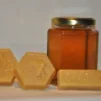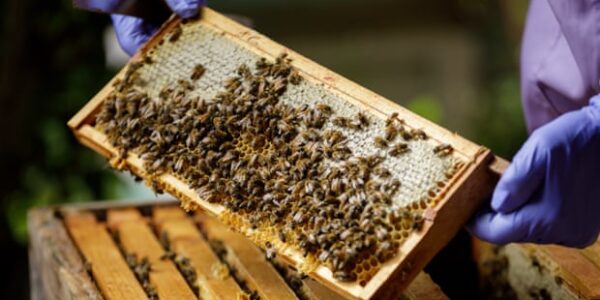Bees
Some people love them some people hate them, others are totally indifferent to them and most people do not know very much about them at all. I have been in the latter category for most of my 36 years, however not any more! If someone had told me a few years ago I’d be keeping bees and loving it I would have laughed…….very loudly!
It all started with an article in a Sunday supplement. A couple explained how they were keeping bees on the roof top of their London flat, how they took great delight in watching their bees flying about and felt they were helping the environment, after all bees and other pollinators are essential to our survival. I reread this article a number of times and a spark of interest had been ignited. The rest as they say is history………
Two years later I have completed a Beekeeping for Beginners course with Fleet Beekeepers Association, kept bees for over eighteen months and passed my beekeeping Basic examination, and yes I do get a buzz from my hobby!
So, why are bees so important and can you really love this buzzy little insect?
Bees and other pollinating insects are essential to the natural world, enabling plant reproduction and in the UK alone it is estimated that honey bees are worth £825 million to the agricultural economy and that every third mouthful of food we eat is reliant on the honey bee. With the existence of Colony Collapse Disorder in the USA where whole colonies of bees simply die out, and the decrease in numbers of wild flowers here, plus the increase in the Varroa mite which stresses a colony and if left untreated results in colony death, honey bee existence is under threat.
It’s an insect and it will sting me!
Bees are indeed insects, belonging to the Hymenoptera order with three body parts, three pairs of legs and two pairs of wings. They have five eyes, yes really, two compound and three simple plus two antennae. If you’ve ever been lucky enough to look inside a colony of bees you will have seen thousands of them all clambering over one another in a rather unsightly fashion and wondered how on earth they manage to live together. The fact is those thousands of individual bees would not survive alone, instead they work together forming a super-organism that enables the colony to function. Each bee has its own role and with maturity this role changes. There is just one boss and that is the Queen. She has her own attendants who wait on her, groom and feed her. She lays up to two thousand eggs a day, controlling the colony by the pheromones she gives off and without her the colony would die out.
But bees sting!
Yes they do but only if they feel under threat. Bees away from their hive foraging i.e. on plants in your garden, will rarely sting unless handled roughly i.e. swatted or stepped on. Bees use their sting to defend their colony and therefore a beekeeper will accidentally be the most likely victim of this, thus a beesuit and veil is worn. When a bee stings you they can not retract the barbed stinger from the skin they have pierced and therefore die, not good for the diminishing bee population! Bees do not sting if treated gently and you are calm around them. Do not confuse them with wasps who are after your sticky summer treat, bees are far more interested in the pollen and nectar containing plants in the surrounding area than they are your child’s ice cream! And how do you tell the difference? Bees are smaller than wasps and more black than yellow, they are also hairy, almost fluffy. Wasps on the other hand have bright yellow stripes, are not hairy and are bigger than honey bees…….oh and will be hovering around your summer picnic whilst the honey bees are busy foraging on your lavender plant or apple tree!
How can we help bees?
You could become a beekeeper. In aiding bee’s survival by helping protect them from environmental factors that are contributing to their declining numbers you are helping their numbers and helping the agricultural industry which we rely on, to continue. Bee keeping is not hard, isn’t that time consuming, an hour or so a week in the summer and maybe a weekend when it comes to harvesting honey…….oh yes, did I not mention honey! Nature’s natural anti-allergenic, a sweet naturally occurring sticky substance that you can consume yourself, give away or sell on to others, bonus!
If you don’t want to be that involved then you could plant bee friendly plants in your garden. Wildflower numbers in the countryside have declined significantly due to pesticide use in farming and reduced availability of wild, natural growth spaces. The increase in smart, neat gardens and hedgerows planted with annuals, bedding plants and other cultivated garden flowers all of which provide little pollen and nectar to honey bees means there is little for them to forage on. Therefore a traditional cottage garden of native wildflowers which incidentally need far less care and attention than neat bedding plants, or not chopping down every “weed” as soon as it makes an appearance in your garden will benefit the bee population. And surprisingly once you become interested, once you start thinking of what you can do to save the plight of the honey bee you will discover fears of stings and weeds in your garden will disappear and be replaced with thoughts of “oh look there’s a bee, great I am helping” and you may find yourself developing a distant affection for the little fluffy buzzy things that we do actually need to help our world go round.
I hope you’ve enjoyed reading, hope you have a little insight into the bees and their plight. For further information on all things honey bee, whether that be planting appropriate flowers or beekeeping visit www.bbka.org.ukYour nearest beekeeping association is www.fleetbeekeepers.com
Happy Honey bee spotting
Carly x




